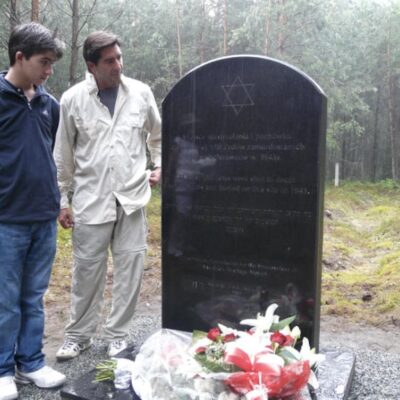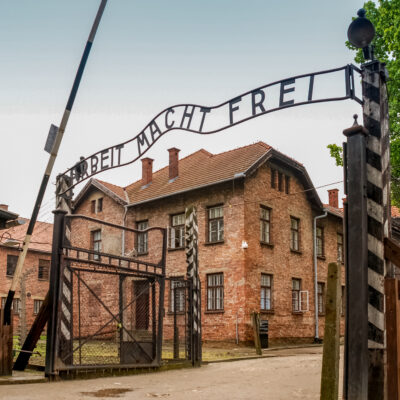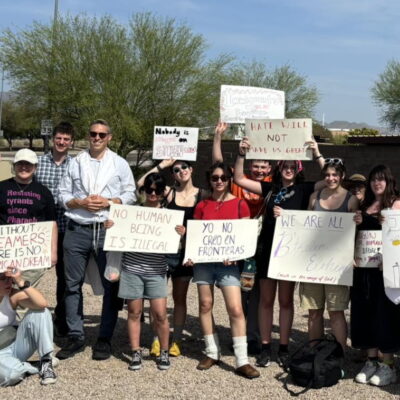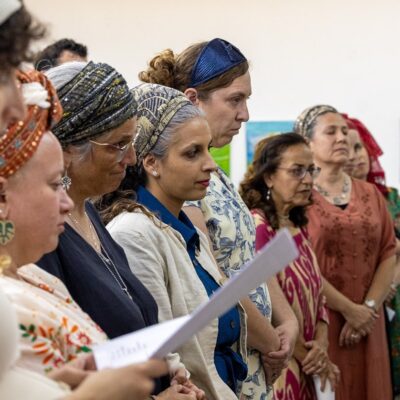Opinion
LET'S BE CLEAR
It is not genocide: A response to Omer Bartov
Omer Bartov is a respected historian of the Holocaust who also teaches about genocide as Dean’s Professor of Holocaust and Genocide Studies at Brown University. We do not impugn his scholarship regarding Nazi Germany’s annihilation of 6 million Jews during World War II, but we substantively disagree with the conclusions stated in his July 15 op-ed in The New York Times, “I am a Genocide Scholar. I Know It When I See It.”
Here is why.

Aris Messinis/AFP via Getty Images
An Israeli army soldier sits in the hatch of a Puma armored personnel carrier (APC) in a column with other vehicles near the Gaza border in southern Israel on October 14, 2023.
To begin with, he accuses Israel of committing genocide against the Palestinian population of Gaza while glossing over, almost in passing, the fact that the present Israel-Hamas war in Gaza was sparked by Hamas’ terrorist attack on Israeli civilians on Oct. 7, 2023. He utterly ignores Hamas’ murderous savagery, their rapes and violation of Jewish Israeli women and girls and their taking more than 200 hostages into brutal captivity in Gaza.
Additionally, as Bartov well knows — or should know — genocide is not an abstract, amorphous term subject to academic or philosophical debate. On the contrary, it has a specific and narrow legal definition as set forth in the Convention on the Prevention and Punishment of the Crime of Genocide, adopted by the United Nations General Assembly in December of 1948 and ratified by 153 countries, including the United States, however belatedly, in 1988.
Under Article II of the Genocide Convention, genocide is defined as one or more of certain specified acts “committed with intent to destroy, in whole or in part, a national, ethnical, racial or religious group.”
These acts are: “(a) Killing members of the group; (b) Causing serious bodily or mental harm to members of the group; (c) Deliberately inflicting on the group conditions of life calculated to bring about its physical destruction in whole or in part; (d) Imposing measures intended to prevent births within the group; (e) Forcibly transferring children of the group to another group.”
As a matter of international law, only one or more of these listed acts can constitute genocide if, and only if, they are committed with the aforesaid “intent to destroy, in whole or in part, a national, ethnical, racial or religious group.”
Israel’s motivation — its intent, as it were — for waging war against Hamas in Gaza was not and is not to destroy the Palestinian presence there. Rather, its motivation for waging war against Hamas following Oct. 7, 2023, was and is to remove the terrorist Hamas organization as an existential threat to Israel’s existence. The contemplation in the minds of rationally thinking Israeli leaders that, after this war is over, there will still be around 2 million Palestinians living in Gaza effectively undercuts Bartov’s charge of genocide.
Indeed, the International Court of Justice has ruled that:
“The dolus specialis, the specific intent to destroy the group in whole or in part, has to be convincingly shown by reference to particular circumstances, unless a general plan to that end can be convincingly demonstrated to exist; and for a pattern of conduct to be accepted as evidence of its existence, it would have to be such that it could only point to the existence of such intent.”
According to the ICJ in the 2007 case of Bosnia and Herzegovina v. Serbia and Montenegro, ethnic cleansing
“can only be a form of genocide within the meaning of the Convention, if it corresponds to or falls within one of the categories of acts prohibited by Article II of the Convention. Neither the intent, as a matter of policy, to render an area ‘ethnically homogeneous’, nor the operations that may be carried out to implement such policy, can as such be designated as genocide.”
We are not arguing that this war has always been waged appropriately or that it has been waged proportionally. Nor do we suggest that Israel or any other country involved in warfare cannot be accused of or should not be held accountable for other alleged violations of international law, including crimes against humanity, war crimes and even ethnic cleansing. But those are separate questions from whether a genocide is being committed; and unless such alleged violations of international law satisfy the elements, including specific intent, as defined in Article II of the Convention, they do not constitute genocide.
Bartov acknowledges “it is crucial to be able to distinguish the attempt to destroy a particular group of people from other crimes under international law, such as war crimes and crimes against humanity.” Unfortunately, he fails to draw any such distinction. He also refuses to engage in the requisite nuance by not holding Hamas and other Palestinian terrorist groups responsible in any way for the carnage.
Bartov is on more solid ground when he quotes certain far-right, not to say neo-fascist, Israeli officials whose language could well be considered genocidal. We, the authors of this article, have held high positions within the Jewish community, and we have a clear and consistent record of condemning such statements; we unhesitatingly denounce and repudiate such sentiments just as we categorically condemn as criminal and terrorist the violence perpetrated by fanatical Israeli Jewish settlers against Palestinian civilians on the West Bank. There is no doubt that elements of the Israeli government and the IDF have advocated a harshness and implemented actions that have little relationship to the intended effort to defeat Hamas; and here too we have consistently criticized such acts and such behavior.
The fact is that a two-state solution remains the only feasible outcome to the Israeli-Palestinian conflict. As Bartov well knows, however, no such agreement was reached in 1948,1967, 1993, 2000 or 2008, and there is no likelihood of such an agreement anytime soon without a change in both Palestinian and Israeli leadership and mindset. It is not the memory of the Holocaust that must be overcome for such an agreement to be reached, but the memory of rockets from Gaza raining down on Israeli civilians, from which Israel withdrew two decades ago.
At the same time, the Palestinians in Gaza will have to try to overcome the catastrophic impact and, eventually, the painful memories of the displacement, death, gruesome physical injuries and trauma resulting from the IDF’s operations there since the start of Operation Swords of Iron.
Both sides and their leaders will be required to find a way to get beyond deep-rooted and understandable hatreds and grievances. Both sides and their leaders will have to look for a way to bring the carnage to an end.
Bartov forgets — or conveniently chooses to ignore — that even the victimized Palestinians have agency. Their fate is not unrelated to their actions. The death toll of civilians correlates to the war crimes committed by Hamas in situating military facilities in schools, mosques and hospitals. Bartov similarly turns a blind eye to Hamas’ flagrant exploitation of the suffering of Palestinian civilians as a tool to undermine Israeli legitimacy.
We share Bartov’s horror and outrage at the number of killed and maimed Palestinian children in Gaza, and at the prospect of a prison-camp-like “humanitarian city” in Rafah. We are dismayed, however, by his unwillingness to show any similar compassion or empathy for the Israeli children murdered by Hamas and Palestinian Islamic Jihad on Oct. 7, 2023, or for the Jewish women and girls who were remorselessly raped and violated on that day.
The terms of the war that began with those horrific events have been dictated by the conditions imposed by Hamas, which uses Palestinian civilians as shields for their military operations. Spuriously charging Israel with genocide does not change this incontrovertible fact.
Michael Berenbaum is the director of the Sigi Ziering Institute and a distinguished professor of Jewish studies at American Jewish University in Los Angeles.
Menachem Z. Rosensaft teaches about the law of genocide at the law schools of Cornell and Columbia universities. He is general counsel emeritus of the World Jewish Congress and the author of Burning Psalms: Confronting Adonai after Auschwitz (Ben Yehuda Press, 2025).














